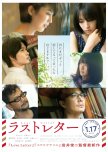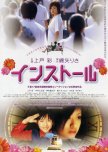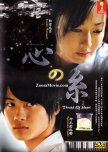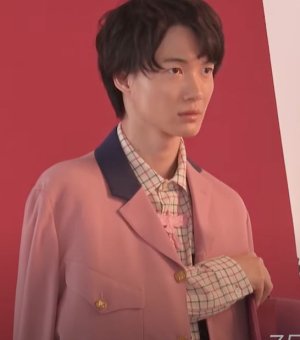
Esta resenha pode conter spoilers
Farewell to the irretrievable Youth
Iwai Shunji was an idol in the movie industry in the 1990s. The young people were obsessed with the beautiful and romantic "Love Letter", "April Story", and "Flower and Alice". The alternative personality was in love with the dark andIn the movie, Matsuko pretended to be her deceased elder sister by mistake, and began a correspondence conversation with Masaharu Fukuyama, the senior who had a crush in high school, which was interesting and a little romantic. After that, the senior's reply inadvertently fell into the hands of his niece Hirose Suzu, and the two generations began to remember and interpret the past.
Regarding the goddess-like sister, except for the memory clips from the high school period, they are all presented in the way of narration by others, just like the male version of "Love Letter". The image of the deceased is pieced together in the memory, without grief or even sadness, as light as daily life, as if tragedy is life.
Some people say that the Chinese version on the contrary, I feel that the mediocrity presented by in the japanese version (I wonder if it deliberately) fits the soul of the character. The humble sister is destined to be the outsider of the story. She humbly looked up at her goddess-like sister in the dark, and could not even feel jealous or feeling sad. She could only take it for granted, smiling and blessing.
Fukuyama Masaharu’s senior interpretation is the same. Is it because he is a novelist because he is so talented that he cannot give up, or is it because of a sentence from his crush? Only one book has been published in half of his life, and people struggle to remember their first love in middle age, not necessarily because of love, but to find and achieve oneself. He is essentially no different from Toyokawa Etsuji, who was loved by others in order to become the "number one man" in college.
Love is incomprehensible, and the goddess falling in love with the prodigal son is also a law. The characters in the movie always sigh, if the sister chooses Fukuyama Masaharu who seems to be obsessed with her, will the ending be different? But moths fighting the fire are fate, saying "if" is nothing but self-comfort of human wishful thinking.
It’s as beautiful as a dream, it’s like a photo album
My interpretation may be cruel, but Shunji Iwai is even more cruel. He specially invited Toyokawa Etsuji and Nakayama Miho to perform guest roles in cynical scum and vulgar pregnant women, and completely shattered the fantasies once held by the public.
The director is still a superstitious star. Matsuko and Masaharu Fukuyama, together with Hirose Suzu and Kamiki Ryunosuke, are all the best first-class stars in Japan today. Kamiki Ryunosuke has the strongest acting skills in the new generation, but he in the movie reminds me of Takashi Kashiwahara, whom I haven't seen in the movie for a long time. The two contrasted and eclipsed. It turns out that the last beautiful boy in Japan is irreplaceable.
Iwai's works are still beautiful, and they are like a photo album. I like the scene of two young girls holding a big dog holding an umbrella most. Masaharu Fukuyama uses the lens to capture it, and what freezes is his irreparable youth.
"Love Letter" highlights the miss, but everything in "The Last Love Letter" is a free will choice, not a love triangle, even regret. Many people criticized "The Last Love Letter" as "not touching enough", I think it is normal, and even suspect that the director deliberately did it. Iwai was a 32-year-old lightly mature man when he filmed "Love Letters". He is 57 years old this year, of course his mood is different. There is no longer a "love letter" reluctance to let go of the obsession, even facing death is indifferent.
The fierce throbbing that shouted "How are you? I'm fine!" at the white snow was gone 25 years later. It's just a pair of middle-aged men and women who cannot love each other, and they meet each other by chance many years later. I remembered that I used to think that there were countless options, I used to believe that the future has unlimited possibilities, but the reality before me is not as expected.
Although the past is unforgettable, after all, you must hide it in your heart, or smile bitterly or smile, and continue on the road.
To be alive, that's all about it.
Esta resenha foi útil para você?

Scripted by prodigious TV screenwriter Mika Omori, Install is an adaptation from the novel of the same name by Risa Wataya, which earned its author the distinction of being the youngest ever recipient of the Bungei Prize for literature at the age of 17. Featuring frankly sexual discussions between its youthful protagonists, though never prurient or explicit, its unaffectedly innocent approach to the subject, as with Shin Togashi’s Gomen (2002), would probably raise more than a few eyebrows from overseas viewers.
Seventeen-year-old high school girl Asako (Ueto from Ryuhei Kitamura’s Azumi), feeling her individuality being crushed by the dull daily grind of her studies, takes to skipping class, sealing herself in her bedroom after her mother goes to work and lying spread-eagled on the floor staring at the ceiling. An attempt to rid herself of all material possessions brings her into contact with Kazuyoshi (Kamiki), a sexually precocious 10-year-old living in the same building as her. Kazuyoshi takes charge of Asako’s computer, and starts lurking around sex chatrooms where he meets a young bored housewife Miyabi who works in fuzoku hostess clubs while her husband is at work. With Asako at a loose end, Kazuyoshi drafts her in to help him set up paid dates for Miyabi, leaving her hidden in his closet sitting in front of the screen and talking dirty to anonymous strangers while he attends elementary school. Internet sex-talk indeed proves a lucrative business for all parties concerned, but in the world of the internet no one is really who they seem, and with neither of them having ever "done it", Asako soon finds herself needing more than just a vivid imagination to maintain the pretence.
With its gracefully gliding cameras and bright vibrant colours, the story cracks off at a bouncy energetic pace within a squeaky clean format honed to perfection by TV director Kataoka, making his feature debut. Though pitched at the teen market, Install rises above the level of a diverting curiosity and turns out to be a pretty fun ride that doesn’t outstay its welcome, and has some interesting things to say about role-playing and the socialisation / sexualisation of youngsters in the early years of the twenty-first century.
Esta resenha foi útil para você?

Esta resenha pode conter spoilers
Honestly. "So-Far" might be one of the most terrifying things I've ever seen.
Honestly. "So-Far" might be one of the most terrifying things I've ever seen.“I want you to learn about death.”
-The Scientist (No idea who voiced him, as little information is available on this anywhere and I can’t read the Japanese credits)
I’ve always personally had a thing for anthology films, particularly those within the horror genre. I guess the attraction stems partly from the marvel at any filmmaker whom can make anywhere between a 25-40 minute story as effective as one lasting say, 2 whole hours, and also because it’s very much a ‘lucky dip’ format for film. Variety is the spice of life, and the unexpected is that which excites the most. As such, this sub-genre has found a place in my heart, despite (or perhaps because of) the variation in quality. Though the anthology film was at its most popular during the 1970’s and 1980’s, it has recently seen a bit of a revival, especially in Asia, which has produced a handful of real gems recently.
Zoo is one such gem, one of the most underrated and criminally underseen anthologies ever made. Of course like all anthologies, one must approach with a certain amount of trepidation, but for me this is likely one of the most consistent in regards to quality, on par with the likes of Three…Extremes. Once more, I’ll opt for my anthology review format and give you the lowdown on each of the five segments from five upcoming Asian directors.
Kazari and Yoko
Directed by: Ryu Kaneda
The first segment, titled Kazari and Yoko and directed by Ryu Kaneda, follows a family in which one daughter is loved whilst the other is neglected by their single mother, taking parental favouritism to the next degree. This story is rather simple, but is not hindered by it and is actually rather good nonetheless. Ryôko Kobayashi plays both of the titular twins, Kazari and Yoko, and does well in a challenging role, and while she’s certainly no Margaret White the mother offers strong support. The tale it weaves is easy to follow, and builds to a twisted conclusion.
Seven Rooms
Directed by: Masaki Adachi
The second segment is one of the more interesting in the collection. Titled Seven Rooms, this entry first establishes itself with a premise not dissimilar with the likes of Saw or Hostel, as a brother and sister wake up to find themselves locked in a prison cell, alongside six other prisoners in separate cells.
The acting here is fine once again, whilst the director manages to create a palpable atmosphere of dread through the inevitability of the countdown, supported by a strong score. Whilst it could have been slightly more menacing, director Adachi does deserve credit for creating one of the more intriguing entries and rounding it off with a touchingly sad ending.
So-Far (So fa)
Directed by: Masatetsu Komiya
Thirdly is So-Far, and one of the finest from the selection in terms of overall quality. It also has far more emotional resonance than much of its fellow segments, primarily due to some sterling writing and fantastic performances from its three cast members. The premise it sets up is probably the most compelling, as a young boy’s parent’s return from a car accident to find they cannot see one another, and yet he sees both. This basic yet interesting concept kept me watching till its conclusion if only to find out where the story was headed and it is capped with a thoughtful finale.
When the Sun Shines (Hidamari no shi)
Directed by: Junpei Mizusaki
Fourth in the series is When the Sun Shines, and is perhaps my favourite of all the segments herein. It’s the only section that is animated rather than live action, but if anything it enhances the mediation on life and Death. The animation is actually rather interesting, a style unfamiliar to myself but visually impressive regardless. One could think it pretentious, in its subject of teaching a naïve synthetic about life and death, but I would argue it is handled delicately and thoughtfully. The colourful palate of the animation is perfectly juxtaposed to the dark content of the tale. It’s really quite the spectacle to watch and ends in lieu with the others with an emotional and melancholy end.
Zoo
Directed by: Hiroshi Ando
The fifth and final entry into the Japanese anthology is a slightly confusing ending to the collection. The plot, which concerns the almost obsessive love of a photographer for his girlfriend and his penchant for taking polaroid pictures of her that extends to dangerous lengths, is an enticing concept that is watchable in its horrific voyeurism. The acting is very good from the couple in the lead, whilst the grainy cinematography enhances the warped tale of lust. Ando display’s some assured direction (though not quite as strong as several other sections in the anthology), and the effects department create some disturbing imagery. Although the narrative is lost on me toward the finale, it is a creepy short and a fine ending to a great anthology series.
VERDICT; Overall, Zoo is easily one of the best Asian anthologies out there, and likely one of my favourite collection films full stop. The acting, cinematography and writing are all generally of the same level of good quality in each segment. The styles differ greatly between each, and there is no overarching or interlinking story connecting each (bar some similar themes, perhaps), but in its entirety this is a very fine anthology. I’d wager it’s one that hasn’t been seen by many, but if you get the chance I highly recommend it.
Esta resenha foi útil para você?

Yakeni Ben no Tatsu Bengoshi ga Gakko de Hoeru
2 pessoas acharam esta resenha útil
Esta resenha pode conter spoilers
A thrilling ride
It is a rapid development.It has become a really interesting drama that you can't take your eyes off from the last time.
The conflict between Taguchi (Ryunosuke Kamiki) and the principal (Kazuki Kosakai) over dealing with students who attempted suicide due to bullying became clear.
Taguchi's stance of going on the path that he thinks is right and refusing to cut off the oppressed things reveals the true meaning of the principal's principle. The principal's idea of trying to ensure a lot of well-being by keeping peace is common in reality and in some cases the best move.
However, it is a peace that is based on the sacrifice and patience of the oppressed, and it is certain that cutting off the few for the majority is an event that should not really be in the field of education.
In the field of education, it must be avoided to let inexperienced students experience such things as "the right thing has no power. If it becomes a majority, it is permissible to be wrong." Because it should be a situation.
It is finally the last inning next time.
Taguchi, who has expressed his opinion from an observer's point of view, is about to start the fight for a job. How will Taguchi, who is in a decisive conflict with the school and may be expelled from the law firm where he works, fight? What does Miura (Seiichi Tanabe) think and act on Taguchi?
I'm really really looking forward to it.
I can't help but be surprised that this is a 30-minute show.
Esta resenha foi útil para você?

Esta resenha pode conter spoilers
I finished watching "Iron Bone" (5 episodes) on WOWOW on-demand.It is a drama version of Jun Ikeido's novel of the same name, which has been made into a drama in WOWOW.
Heita Miyajima (Ryunosuke Kamiki), a young employee who joined the mid-sized construction company "Ikematsu-gumi" for the fourth year, was a "on-site" person, but one day he moved to the business department.
Heita witnesses the "collusion" that prevails in the construction industry when dealing with large-scale projects such as public works projects, which are completely different from the past.
If one big company collapses, all the small and medium-sized companies that undertake it will also collapse ..., thus collusion is necessary evil ... Manzou Mihashi (Kyohei Shibata), an industry fixer He tells us, but the rigging is crowded with politicians who suck sweet juice by speaking, suspicious consulting companies, and major construction companies who are accustomed to rigging and do not try to change the industry.
The characters are attractive, and he is a senior in the business department, Goro Nishida (Shido Nakamura), Risa Shibata (Koyuki) who always encourages Heita, and Iwao Kanematsu (Miyakawa), who makes me feel the difficulty of middle management. Ichirota), Soji Ogata (Seiyo Uchino), managing director of who hired Hirata for an interview.
Even if it is ideal to carry out at a reasonable price without collusion, in reality, government offices try to carry out public works projects at prices that are impossible, and each company is forced to reduce costs unreasonably in order to make a successful bid for it. Or ...
The activities of everyone, including Hajime Naito (Kanji Ishimaru) of the Tokyo District Public Prosecutors Office, who worked hard to detect the collusion, were reliable.
Even in reality, I really wanted the prosecutors to do their best to resist the Abe administration.
Esta resenha foi útil para você?

Big Man Japan is a very clever mockumentary
And now a very different kind of superhero movie. Masaru Daisato (played by the film's writer/director Hitoshi Matsumoto) is the most recent member of his family line to take up the mantle of Big Man Japan, meaning that with just one simple massively unhealthy dosage of high voltage Masaru can temporarily grow into a dude taller than a skyscraper and defend Tokyo from whichever giant monster is trying to stomp it out this week. Problem is no one seems to give a shit about that anymore.Once incredibly popular with the Japanese public, Big Man Japan is now a failing reality show star who is accused of causing as many issues as he purportedly fixes by his detractors, and endlessly shit-talked for his current perceived shortcomings by his "fans". Meanwhile the Big MJ's mild-mannered alter ego Masaru doesn't really have it any better: depressed, separated from his wife and struggling as a single dad, Masaru's essentially a burnt-out government employee with a job so controversial it's left him a complete social pariah, abused (a guy who can turn 30 m tall, abused!) and exploited by just about everyone from his greedy agent to the filmmakers behind the supposed documentary we're watching.
In reality tho Big Man Japan is a very clever mockumentary filled with sly & dry stabs of humor that periodically explodes in bizarre bursts of giant mutated monster fight CGI insanity whenever we finally actually get to see BMJ in action against his gallery of outrageous foes. The pacing of the film is so drawn out and patient during the extended sequences documenting the sorrows of civilian life that it only makes the inevitable giant monster fights in downtown Tokyo all the more jarring and funny. The movie's also smartly comic enough to work as a broader satire of the rise and fall of the entire Kaijū genre, with Big Man as the mainstream pop phenomenon that's now been relegated to being watched ironically by cult followers on late-night TV.
As really only a casual fan of the giant monster genre I was still pretty taken with this well-executed parody and would recommend it, but with a few reservations. The biggest one I'd extend to people is that Big Man Japan is a Mockumentary first and foremost, and a spectacle-laden kaijū film a distant second. It you go into this one hoping to see a bunch of high quality fight scenes featuring giant monsters whooping each other's asses, you might be sorely disappointed. Honestly those scenes are relatively short and take up a small chunk of the overall runtime, and also pretty limited by what appears to be a modest budget and the utilization of some computer animation techniques that are going to seem ridiculously ancient to certain viewers… but for me, the dated, wonky, and downright gonzo CGI fight scenes just added to the charm of it all. Keep an open mind with this one-of-a-kind faux-docu-creature feature and you might be charmed too.
Esta resenha foi útil para você?

Whimsical
The lightness, genuineness and sensitivity with which the Japanese people manage to tell certain stories are incredible, managing to transform even the simplest things into something magical. To have an example, it would be enough to see how Into the Faraway Sky begins, with the two young protagonists who meet by chance - with impressive naturalness - while they pee on the edge of a country road: Kohei is rough and impetuous, but he has goodness and fortitude. Deliver milk every day down to town. Ryosuke, on the other hand, is the newcomer, he comes from Tokyo and his father has just moved to that remote village with the aim of driving out the inhabitants. The Japanese government intends to build a huge airport in its place. It was many years ago. Just an ideal panorama for Isao Yukisada (former director of beautiful films such as A Day on the Planet and Crying Out Love, in the Center of the World), who, as usual, leverages the deepest melancholies of the human soul, filtering his story through the eyes of a group of children and stuffing it all with characters to say the least over the top. To be clear we are around Always - Summer on the Third Street (Takashi Yamazaki, 2006), but with the same nostalgic vein as When the Show Tent Came to my Town (Yoshihiro Fukagawa, 2005) and a pinch of the pop madness of Memories of Matsuko (Tetsuya Nakashima, 2006): the result is a work that for its entire duration makes you feel small and manages to entertain even the most frivolous things, as during the long and insistent sequence in which Kohei and Ryosuke go around putting firecrackers in the cows' shit to treacherously dirty the unsuspecting passers-by. But then they meet Hiharu, a strange little girl who observes the stars every night hoping to one day be able to see the UFO that, according to her words, would have kidnapped her father. The three become inseparable and their friendship grows stronger while the diatribe rages in the village over the construction of the airport, which sees part of the inhabitants against and part in favor: Kohei, Ryosuke and Hiharu live the problem with the lightness of children. and they will try to solve it in their own way, with imagination and ingenuity, during a summer that they will never forget and that will mark them forever. The choral structure of the film allows us to follow several other parallel stories, creating an exciting and daring mosaic made up of flying men, gangs of crazy criminals and unlikely marriages. And between a surreal curtain and the other, at the end Yukisada abandons the usual realism of his stories and lets himself be abandoned to the imagination, just like the children protagonists of the film. Because - as Kohei's father also says - anything can happen when you believe it is possible. A basic poetics that has led someone to bother even the master Miyazaki, perhaps exaggerating in drawing a parallel with Yukisada. But Into the Faraway Sky is a film that makes you feel good, and that's enough. Unmissable. gang of crazy criminals and unlikely marriages. And between a surreal curtain and the other, at the end Yukisada abandons the usual realism of his stories and lets himself be abandoned to the imagination, just like the children protagonists of the film. Because - as Kohei's father also says - anything can happen when you believe it is possible. A basic poetics that has led someone to bother even the master Miyazaki, perhaps exaggerating in drawing a parallel with Yukisada. But Into the Faraway Sky is a film that makes you feel good, and that's enough. Unmissable. gang of crazy criminals and unlikely marriages. And between a surreal curtain and another, at the end Yukisada abandons the usual realism of his stories and lets himself be abandoned to the imagination, just like the children protagonists of the film. Because - as Kohei's father also says - anything can happen when you believe it is possible. A basic poetics that has led someone to bother even the master Miyazaki, perhaps exaggerating in drawing a parallel with Yukisada. But Into the Faraway Sky is a film that makes you feel good, and that's enough. Unmissable. Because - as Kohei's father also says - anything can happen when you believe it is possible. A basic poetics that has led someone to bother even the master Miyazaki, perhaps exaggerating in drawing a parallel with Yukisada. But Into the Faraway Sky is a film that makes you feel good, and that's enough. Unmissable. Because - as Kohei's father also says - anything can happen when you believe it is possible. A basic poetics that has led someone to bother even the master Miyazaki, perhaps exaggerating in drawing a parallel with Yukisada. But Into the Faraway Sky is a film that makes you feel good, and that's enough. Unmissable.Esta resenha foi útil para você?

This movie is one of the most genuine portrayals of high school life in Japan
The Kirishima Things looks a bit simple on first glance, there's a sharp and poignant little film hiding behind its inconspicuous facade.Yoshida is know to balance his work between comedy and drama, but his true signature is the cheeky, somewhat darker sense of humor that can be found in each of his films. Not always in the same quantities or with the same vibrance, but it's always there, lurking and waiting to leap out at the audience. Even though The Kirishima Thing's dramatic impact clearly outweighs the comedy, fans of Yoshida's work are sure to flash a couple of devious smirks while watching.
One of the smaller details that had me amused early on, is the chapter approach Yoshida took to work his way through the story. While he opted to split the narrative in classic days-of-the-week divisions, the first four segments are in fact alternate takes on the same event, all aptly titled "Friday". Not very functional, I admit, but definitely worthy of a respectful smile. There are several similarly fun details and/or moments, but it's really up to the audience to filter them out. Should you miss them though, no need to worry because the film is easily able to survive on its dramatic strengths alone.
The story revolves around Kirishima, a model student of a local high school. With a volleyball final and university selections coming up, Kirishima shuts down completely and disappears from public view. Nobody knows what exactly happened, but he isn't responding to anyone, not even his best friend and his girlfriend can get through to him anymore. Without a clear role model, the class scrambles to get through one of the most critical moments of their year, at the same time the disappearance of Kirishima prompts several of his classmates to crawl out from under of his shadow.
Yoshida's visual style may not be all that flashy or in your face, but it is ultracrisp. Tight camera work, strong contrasts and bold color tones (mostly blues, but the film doesn't look cool or dreary in the least) all help to make the visuals pop. In broader lines it isn't all that different other Japanese dramas, but where those tend to go for a softer and dreamier vibe, Yoshida isn't afraid to keep it clean and potent. Bottom line: the films looks beautiful.
The soundtrack is mostly notable in its absence. There are maybe two or three scenes where additional music was added to the film and one sequence where a brass band rehearsal is mixed into the main narrative, building up to a rather impressive climax. The rest of the soundtrack is just ambient noises, though often set up in such a way that they do create some sort of practical rhythm. It shows that Yoshida is very much aware of the power of sound, but is restrained enough to use it only when he feels it would add something to his film.
Acting Wise there's nothing to complain about either. Equal parts deeply affecting and funny, with Ryunosuke Kamiki's (Ryoya Maeda) performance mostly supplying the latter. His comic timing and movements moved the audience at the Japanese embassy's annual film festival here in the Philippines to tears (from laughter, that is). The stereotypes are only mild and understated and none of the characters are too introverted, so even audiences used to Western films should have an easy time getting through to the characters.
What's most interesting about The Kirishima Thing is that its main character is never really there. Apart from the introduction (where we see him a couple of times from the back - though without the context of the rest of the film you won't even realize), Kirishima is entirely absent. Even so, his presence is felt in every scene. Don't expect to learn anything about him either, as the film is more interested in examining the effect Kirishima's absence has on his classmates. The themes here are pretty universal and recognizable, except that the focus on the Japanese school system and its fascination with school clubs might still alienate some people.
While Yoshida has quite a few stories to tell and quite a few angles to explore, the film still feels like a very tight package, sporting little to no cruft. The Kirishima Thing is not a spectacular film, but Yoshida's direction is so deliberate and steadfast that it sucks you right in from the start. It's beautifully shot, aptly scored and well acted and it gets extra bonus points for its Tetsuo hommage. An easy recommend for Yoshida fans, but I feel pretty confident the film could also appeal to a wider audience.
Esta resenha foi útil para você?

Osaka movie
The story that progresses slowly and the life-sized characters convey the liveliness and warmth of Osaka. Even a drama series in the morning is fine.I don't think he was doing that kind of production, but is it native? I feel Osaka. Osaka is full of humanity. If there is a genre called "Osaka movie", it is an entry without complaint.
A heart-warming story of parents and children. It is a story that children who feel inferior to their father can understand each other by looking at their parents' backs
I thought I had to watch it
someday , but I couldn't get my hands on it, but I took the plunge and watched it. No, I watched it until the end. A story that you can enjoy even if you are not a fan, and the performers who stand up as characters make you laugh. Lastly, I'm glad that Kamiki, who speaks the Kansai dialect, was bright.
Esta resenha foi útil para você?

Esta resenha pode conter spoilers
Where have you been my entire life? Powerful, memorable and almost perfect.
The acting, the beautiful signing. Matsuyuki is a force to be reckoned with in here. Her expressive eyes more than speak for her. The cinematography is simple and effective. The script is well written and more importantly, paced well.Kokoro no Ito is a simple story. There is a deaf woman named Reiko who lives with her son Akihito in a small apartment. Though they live a humble life, the two are in sync and are simply used to living their lives the way that they have. Reiko works at a processing company gutting blowfish. Akihito is a high school student preparing for university exams. Reiko dreams of Akihito becoming a professional pianist and lovingly sews him a cover for his piano. As Akihito grows up, he becomes increasingly aware of how different his life is compared to other youths. He feels old and more like a parent than a child as he goes with his mother to meetings with the developers planning to tear down their neighborhood.
The communication between a mother and son transcends words. But as time passes, their thoughts change and their opposing opinions clash. Communication is lost and anger is sown and frustration spirals out of control.
Kokoro no Ito, or A Hearts’ Thread, perfectly illustrates the disintegration of Reiko and Akihito’s relationship while at the same time showing that broken things can be mended, that there is always a thread waiting to be connected to another heart.
Matsuyuki challenged Kamiki to find his role, to live his role, to become Akihito and I don’t know if I can confidently say that Kamiki gave the best Akihito he could. Every time Matsuyuki acted against Kamiki, I was hard pressed to stay impressed by Kamiki’s resume. That’s not to say that Kamiki gave a horrible performance. He didn’t. He acted his role well, but I don’t believe that he was able to reach that next step just yet. He tried and he failed. He was outshone by Matsuyuki’s Reiko.
I think that Kamiki has been riding high for most of his career. With Kokoro no Ito, I want to believe that Matsuyuki Reiko pushed him to remove himself from his comfort zone. She taught him a lesson by completely overpowering him with her acting to show him that there is a long road ahead of him, and it’s up to him to push forward. Also, Tanimura Mitsuki did a competent job as the go-between for Kamiki and Matsuyuki. Sorry. I don’t have much to say about her. She wasn’t bad but she also wasn’t exactly memorable. I do give her props for not backing down against Matsuyuki though.
Neatly wrapped up but not so much that it becomes diabetes-grade sugar inducing.
Esta resenha foi útil para você?

Exquisite!
Communism, capitalism, developed countries, developing countries, blacks, whites, yellow races.Everything is messy.
Idaten has portrayed many wars,
the deaths of his companions,
the unpleasant aspects of politics,
the conflict between nations, and
the problems of money
.Not only beautiful things, but also the existence of such problems, but still
Human and human to interact with it to compete using only the flesh and blood of the body "celebration only for peace" is, the fact that "is held once in four years", the "great hope" for us all over the world of mankind in Isn't it?
The closing ceremony scene and ending scene are filled with the hopes of humankind.
Esta resenha foi útil para você?

The story is relatively unhappy one
This is another 5 episode WOWOW drama. The original is Keigo Higashino's medical suspense. What is a human being? What is love? Where is the heart? It depicts a sad love story centered on miraculous medical science and forbidden technology.I've read everything from Keigo Higashino's work from "Makyu" to "Masquerade Eve", so I should have read this too, but I forgot about it as usual, so I enjoyed it enough as a suspense drama.
Above all, "Dark Ryunosuke Kamiki" other than Ninomae (Ninomae Juuichi of the drama "SPEC") is fresh. I think the other characters were also exquisite and good casting. The one that seemed to be particularly suitable was Fumi Nikaido, who played the role of Megumi. I also liked Makita Sports, the owner of an art supply shop where Megumi works.
The story is relatively unhappy one. I am not surprised because Higashino Keigo tends to write such stories. Certainly, the plot is really sad. However, I was impressed with the sorrow of the last part.
I want medicine that can save someone to develop steadily, but what if someone is making a life-threatening sacrifice behind the scenes of research? I think ...
In fact, however, not humans but mice are used (as guinea pigs to test something new)... then, some think rats good, but they also have life.
This makes me annoyed. After all, I can’t help thinking severely that this world is made up of “our rules we human beings made”.
This lesson is very deep and serious, I think.
Esta resenha foi útil para você?

If you don't meet, it's the same as if you're dead
Mizuki's words, "If you don't meet, it's the same as if you're dead," are input to your head, and although it's not the original meaning, "There are many people who haven't met for a long time, but when I remember, I feel lonely." From my thoughts, I came to think that "I just don't see the dead people," and I feel less sad when someone close to me dies.I'm not very good with romance movies, but I became a fan of Tamaki Kun and changed my mind when I saw his old works.
His unique transparency makes even the kissing scene beautiful, and the air of the whole movie is mysteriously sparkling.
Also, it was good that Kamiki-kun, who was a child, had a similar atmosphere. The contrasting brightness of Mr. Konishi was also very good.
Esta resenha foi útil para você?





